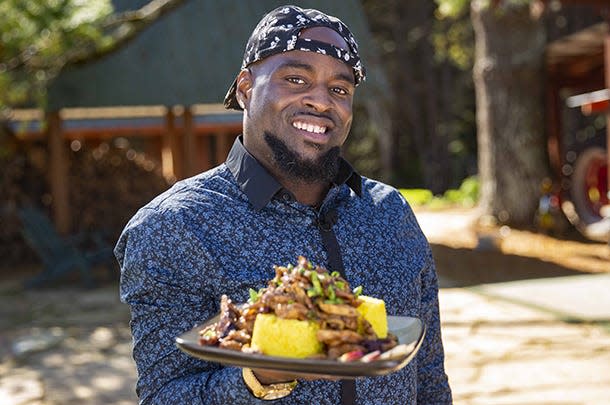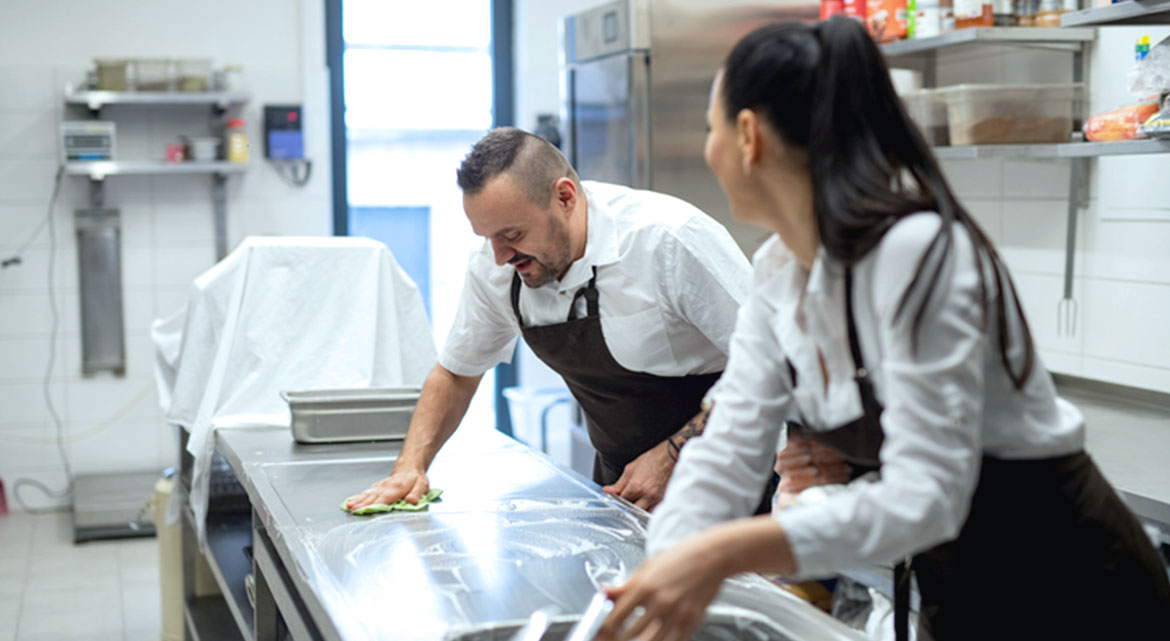4 Asheville chefs to enter live cooking competition. Here’s how to taste and vote.
ASHEVILLE – Four local chefs are setting out to prove that one person’s food scraps can be another person’s appetizing meal.
Food Waste Solutions WNC is partnering with Wicked Weed Brewing for an inaugural cooking competition that challenges chefs to make a dish that will win the most audience votes. The twist is that they will have to use parts of ingredients that people often consider unusable and toss out.
“We invited chefs in the area to prepare little snacks or bites using rescued food from their own restaurants that they’re cooking,” said Kiera Bulan, member of the committee and sustainability coordinator for the city of Asheville. “We’re asking chefs to take food that might otherwise be thrown away or be composted and make something creative and tasty out of it.”
Taste It, Don’t Waste It! Asheville Chefs Challenge will be 2-4 p.m. May 1 at Wicked Weed West, 145 Jacob Holm Way in Candler. The event is free and open to the public. It will include live music performances and resource information from local food waste reduction partner organizations.
Food Waste Solutions WNC is a volunteer-based group that works to reduce food waste in Western North Carolina. The chefs’ challenge is part of the group’s Food Waste Reduction Month series that has continued through April, with support from the city of Asheville and Buncombe County. The campaign works to provide education and share resources on the impact of food waste while demonstrating how the community can make a difference, Bulan said.
Also, the Food Waste Challenge was launched on social media that prompts participants to complete tasks at home for a chance to win prizes. The bingo-style contest’s prompts include performing a home food waste audit and dropping off food scraps at one of the city’s compost sites.
Related: Bears, composting and Asheville’s solution to 1,000 of pounds of weekly food waste
“(We’re) just trying to activate and educate the community around what food waste reduction is, why it matters (and) how it’s connected to other issues like the environment, climate change, etc.,” Bulan said. “We’re rolling it back out this year with a little more energy and intention and have this flagship event, Taste It, Don’t Waste It! tied to the end of Food Waste Reduction Month.”
Taste It, Don’t Waste It! is to show how extending the life of scraps can keep them out of the trash, which reduces what goes to landfills. Event attendees will be invited to sample the dishes the chefs have created and vote for their favorite.
Competing chefs Eric Morris (Cultura), Clarence Robinson (Cooking with Comedy and soon-to-open Areta’s Soul Food), Steven Goff (Tastee Diner) and John Rice (Wicked Weed Brewpub) are aiming to change how people view and handle food so that there is less going to landfills and more going on the plate.
Meet the competitors
Eric Morris
Morris, the executive chef at Wicked Weed’s Cultura restaurant, was taught to make the most out of an ingredient when working in professional kitchens. However, in his 20 years in the food service industry, he’s witnessed many “alarming” situations in which large quantities of food are thrown away.

“Food waste is a huge issue,” he said. “Areas surrounding Asheville there is a lot of food insecurity. And being vocal, especially in the restaurant industry, about really trying to limit how much waste you produce is a good practice and I wish it would spread to more places.”
“The reason for doing that is having the respect for the amount of time and energy to grow something, especially animals. As a chef or someone working in the food industry, it’s just responsible practice to try to utilize every little part of the ingredient,” he said.
However, a person doesn’t have to be a professional culinary artist to make it a practice.
“It’s not difficult to do. It takes a little more time and thought. The biggest component is to have a plan to utilize your food scraps,” Morris said.
Preservation methods require some knowledge of canning, pickling or dehydrating, but the results are rewarding as it creates a larger pantry of food items at a person’s disposal, he said.
For garlic greens, Morris dries out the top to make a powder used to make pasta dough. While some may see the roots as inedible or compost, Morris repurposes them by blanching then drying them out and lightly frying them.
“It tastes like a wonderful, light garlic chip that I can use as a garnish or topping for something,” Morris said.
Sweet potato peels are saved and roasted, then cooked in water until the sugar and starches are extracted. Next, reduce the liquid until it becomes a natural sweet potato gravy. Morris uses the gravy on root vegetable mash, he said.
“There’s so much potential and so much flavor that’s just going into the bin,” Morris said. “Actually putting thought into how to utilize these scraps can produce something totally new and original and just as delicious as a traditionally made product.”
Clarence Robinson
Robinson, chef and founder of Cooking With Comedy catering company, noticed the high amount of food that would go to waste in many restaurants he worked in the past. He saw pieces of onion, peppers, tomatoes and meat thrown away when they could have been used in other dishes.

“I grew up in a household where we weren’t wasteful of food,” Robinson said. “This is an opportunity for me to showcase my talents and skills for the community of folks who don’t know how to use leftovers or utilize the scraps that they have.”
Robinson finds uses for ends of onions and peppers and trimmings of cucumbers and whole sweet potatoes that may be used for sauces and other dishes. He is looking forward to showcasing innovative ways for others to get the most use out of ingredients.
“I was excited when they came up with this. It was a good idea and hopefully, other chefs in the city will take the time to jump out and show people stuff,” Robinson said. “I’m going to come and bring the flavor, bring the creativity. I can’t wait to create something they’ve never heard of — something they’ve never seen out of the scraps that I’ve saved.”
Steven Goff
A change of perspective is a key component to becoming creative with ingredients, said Goff, chef and owner of Tastee Diner. It begins with not viewing ingredients as food scraps or trash but as trimmings and viable food.

“In a lot of upper-scale kitchens, the wordage you use is so extremely important, so like when we’re cleaning up a piece of meat, you would never call that scraps – it’s trim,” Goff said. “Framing words in the proper sense to sound appetizing.”
Using the whole animal and plant is a matter of respect and responsibility, he said.
“Food waste is one of the main tenets of how I run a kitchen — minimizing food waste,” Goff said. “We throw next to nothing away in my kitchen. Part of that is because we’re respecting the farmers and growers who raised our products, we’re respecting the fact that people are starving in the world and we’re respecting the plant or animal that died and gave us that. Food waste is probably one of the most important things to me in cooking.”
It also helps cooks get more bang for their buck.
“A lot of Asheville restaurants do great at it,” Goff said. “It’s definitely a popular thing in kitchens. … It’s cooking for your bottom line. Find a use for that thing rather than waste it.”
Goff uses the bones and gristle from a smoked whole hog to make a smoky pork stock. Stems from kale, collard greens and cabbage are pickled and made into a relish. Or they are sliced down and eaten raw or added to tuna or potato salads. Whey from cheese is used for demiglace.
“Chop up those plant stems and throw them in your pasta if you’re making a dish,” Goff said. “A lot of times, I love a vegetarian dish of kale sauteed up with some pasta and maybe a little cream and garlic. Stems thrown in adds that nice bit of texture and crunch.”
John Rice
Rice, the executive chef at Wicked Weed Brewing’s brewpub, is regularly seeking creative ways to reduce or eliminate food waste, he said.
“Not only does the practice help our bottom line, but we also feel that we are stewards for our city, our restaurant community and for the welfare of our planet,” Rice said.

The food service industry handles high volumes of perishable food, and though some waste is inevitable, it is important to use ingredients in a timely, efficient and responsible manner, he said.
“The largest category of potential food waste we see on a daily basis is that associated with fresh produce,” Rice said. “At Wicked Weed, we use the majority of our fresh produce ‘scrap’ for making stocks consisting mostly of onion skins, carrot peels, celery root-ends, herbs, tomato ends and mushroom stems. These items, that would usually end up in the trash — or compost — are simmered in water to become the flavorful stocks that are the backbone of our soups and sauces.”
Planning and organizing are vital for minimizing food waste, he said. He recommends devising plans for reusing and repurposing items that would otherwise end up in the trash.
“One great way to reuse produce comes in making pickles. Pickled products are becoming more and more popular and are a great way to use parts of produce that are too small or unsightly,” Rice said. “My favorite of all pickles — pickled red onions — are often featured at Wicked Weed because of their versatility to complement many dishes, and the fact that they are a delicious use of produce that could otherwise be wasted.”
The hope is that the event will be “an eye-opener” for attendees as they discover how food scraps can become something tasty, he said.
“I think the audience will leave with a better sense of what to do with ‘scraps’ and may be inspired to try recipes consisting of what they already have on hand,” Rice said. “These practices save our business money and can do the same for those cooking at home on a budget.”
Tiana Kennell is the food and dining reporter for the Asheville Citizen Times, part of the USA Today Network. Email her at [email protected] or follow her on Twitter/Instagram @PrincessOfPage. Please help support this type of journalism with a subscription to the Citizen Times.
This article originally appeared on Asheville Citizen Times: 4 Asheville chefs enter Taste It, Don’t Waste It! cooking competition








